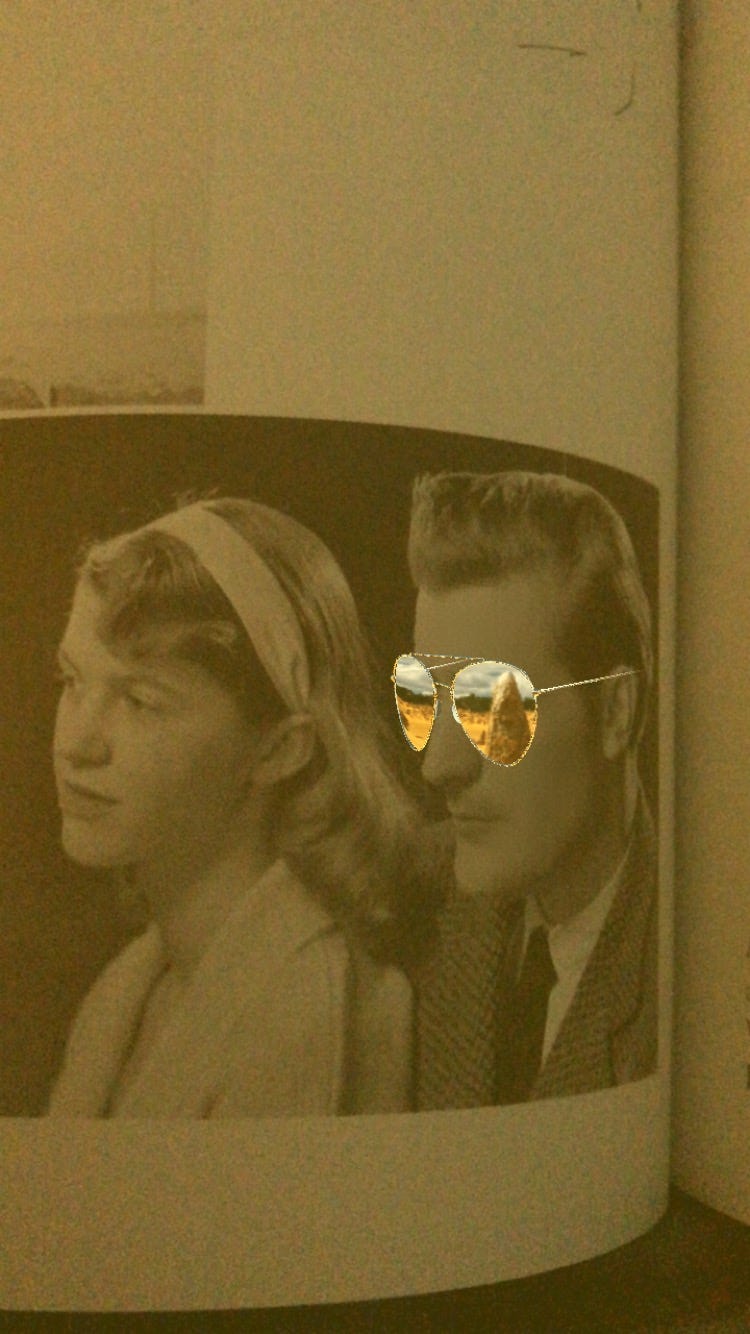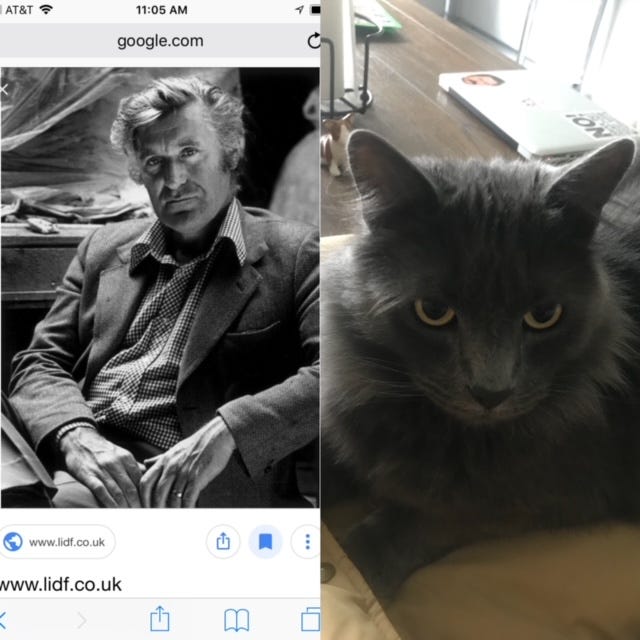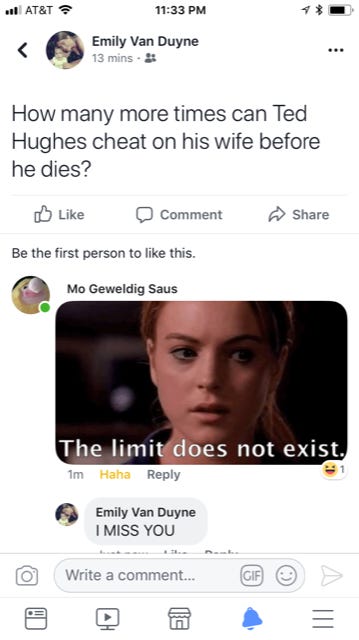Epiphany, Or:
Does Anyone Really Think Ted Hughes Almost Bought A Fox Cub on a London Bridge in 1960?
Dear Plathians,
Back in 2017, I wrote an article about how our inability to believe Plath when she tells us that Hughes harmed her is part of a larger cultural bias we have against women’s voices. I wrote it on Easter Sunday after a mimosa and thought it was a toss-off—I had been singing this tune about Plath and Hughes for years and, mostly, people told me I was either wrong, or that I should “get over it.” I was shocked when it was taken immediately for publication by LitHub, and stunned when it went viral.
Since then, I have gained some traction in the Plath-Hughes world by writing frankly about my belief that Hughes was physically and psychologically abusive toward Plath, and that, more lastingly, his attitude toward her life and work was picked up by other powerful writers and critics, who constructed an image of Sylvia that had almost nothing to do with who she was in reality.
In other words—spoiler!— I’m not exactly Team Ted.
And that’s just my professional, writerly world. For a long time my Twitter bio read, “I enjoy making jokes about Ted Hughes on various social media outlets.” I once photoshopped aviator sunglasses onto a studio portrait of him and Sylvia.
I once made side-by-side photos of a gray, muttoned-chop Hughes and my large gray cat, LeBron James, with the caption “Who Wore It Better?”
And who could forget this classic, from my reading of Jonathan Bate’s biographical Ted-tome, with a little assist from my former student and dear friend, Moneeba?
(For the record, Ted can’t sit with us.)
So, it came as quite a shock when, a few weeks ago, I got an email from someone at a tony UK publicity firm asking me if I’d like a copy of a book called Your Story, My Story, by a Dutch writer named Connie Palmen, translated from the Dutch by Eileen J. Stevens and Anna Asbury. The title is derived from the last lines of Ted Hughes’s poem “Visit” from his book Birthday Letters.
If you’ve subscribed to this newsletter, I imagine you’re already familiar with Birthday Letters, but just in case you’re not: Hughes published this book of poems shortly before his death from cancer in 1998. It’s long, especially for a single volume of poetry—198 pages about his life with (and without) Sylvia Plath. He wrote it over a period of more than 30 years. It won a big prize and scored mostly huge reviews. Hughes is always getting huge reviews. The edition of his Collected Poems that I own has a front cover blurb that says something like, “A massive achievement it will take us years to absorb… if indeed such understanding is even possible.” (I sometimes yell “IF INDEED SUCH UNDERSTANDING IS EVEN POSSIBLE!” in a fake British accent at my cats.)
In any case, Your Story, My Story was pitched to me by the publicist as “mesmerizing,” a fictionalized account of the Plath-Hughes marriage which was, “…buried beneath a mudslide of apocryphal stories, gossip, sensationalism, and myth. Until now.” The book is a first-person narration by the Hughes character. I was intrigued, not by the book itself, but by the offer of a free copy, which typically means the publisher or publicist is looking for a review. Given… lots of things, only a fraction of which I’ve discussed above, I couldn’t imagine why anyone would want me to review this book.
But curiosity got the best of me and I said, Sure! Send it along.
I don’t know why the publicist sent me the book, but I do know why I agreed to read it. I have this thing about Ted Hughes (I can hear all of you laughing from here, btw). The thing is not what you’re thinking— it’s not contempt. It’s something resembling hope, although that’s also not quite it. When I was first reading about Plath and Hughes, in high school, I was only invested in Plath. I was bonkers for The Bell Jar and read my copy of Ariel until the spine came off. Subsequently, I read two biographies of her— Bitter Fame, by Anne Stevenson, and Linda Wagner-Martin’s Sylvia Plath: A Life. Neither book impressed me especially and I zeroed in on Plath’s breakdowns and death like the grim little suburbanite I was. Hughes just felt ancillary, another player in her life story— I didn’t like or dislike him. It wasn’t until I got to college and reread Bitter Fame that I thought I ought to take a crack at his work. I did it out of curiosity, but also because Plath loved it so much that I assumed I’d feel the same way about it. I bought The Hawk in the Rain with a thrill, sure I’d feel the kind of excitement I did when I read Sylvia’s work.
Reader, it was all predatory birds and tits. It was not for me. That same year, my aunt bought me Birthday Letters, which had just come out. Since the poems purported to be about Sylvia, my heart—again!— leapt with that feeling.
The poems didn’t even read like poems to me. They were just… blah. Slack lines and false mythologies. Does anyone really feel that way about their lives? I mean, I guess they do, but what a bummer for them. Plath gets this rap as a cheerless Goth girl, but the truth is, her work is funny, really funny in spots, and often warm and full of vital joy— think of a poem like “Kindness,” written in the last weeks of her life when circumstances were rough, and our girl is all Chinese silks! Steaming mugs of tea! Dame kindness, she is so nice! Birthday Letters manages to finagle the joy out of picking daffodils in an English country spring, for Christ’s sake. Everyone’s biting each other and setting fires to imaginary funeral pyres. You wouldn’t think one would have to make Plath’s story grimmer, but Ted manages nicely.
But, even after this, I kept trying. I keep trying. I have an ongoing argument with my dear friend Julie Goodspeed-Chadwick, a scholar of Plath, Hughes, and Assia Wevill, Hughes’s lover after he left Plath. She loves Birthday Letters; she loves it so much and I love her work so much that this summer, pregnant as fuck, I picked it up again and read it straight through with that old feeling— this time, I would feel the magic.
*insert shrugging emoji here*
Am I just missing something when it comes to Ted Hughes? I think I’ll always wonder. I’ll always look.
So when I was offered a free copy of Your Story, My Story, I said yes.
One of the things I try to avoid when writing about Plath and Hughes is this ridiculous idea that one person is right and one person is wrong. This may sound crazy, given my obvious affinity for Sylvia Plath and my disdain for Hughes. But having made it to the respectable age of 41-years old, I’m more inclined than ever to view their marriage as the kind of major mistake many of us have made, only to look back later and say, I was 25, what do you want? Look how hot we were! Images of Plath and Hughes from 1956, the year they met and married, show two absurdly gorgeous people who also happened to be great writers. She was obsessed with a creepy sculpture of her head someone gave her. He used to show up at her Cambridge University dorm with pockets full of horoscopes and shrimp. Who am I to judge? I once slept with the manager of a Parisian youth hostel behind the front desk. We were all young, once.
For this reason, Birthday Letters and Your Story, My Story bug me. Both are prefaced upon the idea that Hughes is telling his “side” of the story for the first time, which is in and of itself ridiculous. For the 35 years that Hughes lived after Plath’s suicide, he controlled the official narrative of her life and work, which was necessarily also, in part, the narrative of his life and work, since the two of them were married for almost seven years. Diane Middlebrook believed that Hughes hated this kind of public exposure so much that he developed a persona to defend himself against it— in his notes to Plath’s 1981 Collected Poems, he described himself as “her husband”— Middlebrook wrote a famous biography of the Plath-Hughes marriage with that same title. This is true enough, but it doesn’t change the fact that Hughes was actually writing publicly about the events of their marriage and its failure, there and elsewhere. It’s true that Birthday Letters was a more emotional treatment of that material, but it’s not true that it was the first time he had written or spoken about his marriage to Sylvia Plath.
And it’s definitely not true that Your Story, My Story is telling the reader a single thing they don’t already know if they have read Birthday Letters which, as Peter Steinberg wrote on his blog, Your Story, My Story essentially plagiarizes. What we learn— if anything— from reading Your Story, My Story is that there is still this weird belief that Ted Hughes has somehow been wronged in the telling of his marriage to Plath and its terrible ending. I know this is rooted in people who blamed him for Plath’s death, but I think those individuals were pretty few and far between. There is a difference between blaming someone for someone else’s suicide and simply believing they wronged that person in their lifetime— that, I think, is where the distinction is often lost in the Plath-Hughes narrative. Many people— friends and family of Plath and Hughes, fans of both or one of them, scholars, artists— believe that Hughes wronged Plath and still hold that she was the one who made the choice to end her life. I am one of those people, as are most of the Plath scholars and fans (I’m both) I know. Your Story, My Story, like Birthday Letters, absolves Hughes from any responsibility whatsoever for the end of his marriage and the harm it caused his wife because it’s prefaced upon the idea that Sylvia was doomed by some combination of astrology, poetry, fate, and the ghost of Otto: The Dead Dad. Like the “I” of Birthday Letters, the Ted of Your Story, My Story moves in a mythical world of his own making, one where Cockney lads out of Central Casting appear on London Bridges carrying fox cubs in their coats and offer them to Ted “for a pound. Somebody’ll buy him! Cheap enough at a pound!” Right-y-o, Guv’nor! Step in time! And even that nonsensical scene is somehow used as a way to denigrate Plath— as Hughes walks, tragically foxless, away from Alfred P. Doolittle he asks himself, in both Birthday Letters and Your Story, My Story, What would happen if he brought the foxy little bugger home to his broom-closet like flat in Chalcot Square, where his wife (or, as he says constantly in Your Story, My Story, like a Vampire prince, “My bride”) awaits with their infant daughter?
Reader, you know what he thinks would happen. Sylvia would be the nagging American bitch we all know her to be and refuse this poor Cockney fox (who in my mind is now the Disney version of Robin Hood, and wearing a fetching green peasant blouse and feathered cap) his lodging. No wild animals in this house, Ted, if I’ve told you once, I’ve told you a thousand times. I mean, both books seem to say, really— can you blame the man for leaving this woman?
It was a fox. It was fate.
Like a lot of writers, I have a vivid dream life, and the ability to recall my dreams. I won’t bore you with irrelevant details, but it feels important to this piece, somehow, important in a way that is hard to name, like the feeling I get when I pick up another book by or about Ted Hughes, to tell you that while I have only ever dreamt of Sylvia’s banshee, I have dreamt many times of Ted Hughes, alive and well and in the flesh. Most recently, I dreamt I stared at a candle with a tall thin black wick & flame. Ted Hughes appeared & said, I wrote for her, you know, & held out his hand. I took it & we walked toward a wall where the candlelight flickered. He disappeared through the wall. I sat on the other side of it, stuck.
When I wrote about this on Twitter, someone replied that they had been friends with Hughes; that he would have liked my dream, and I felt it again— that indefinable feeling. A creepy little frisson.
So I have to ask myself— do I return to this material again and again because I want to like Ted?
Or because I want him to like me?
Until Next Time, I Remain,
Your Own,
Emily





Suspect the answer could be a bit of each. And from all i've read of Hughes, by Hughes, can practically guarantee he would've liked your dream.
Because of my love for Sylvia, i hated Ted for a very long time, and it prevented me from being able to read his work. Then, some years ago, a good friend-- a pretty brilliant female poet, who loves Sylvia too-- told me I was only punishing myself, and gave me the Complete Poems volume you mentioned, for Christmas. I opened it-- tentatively, staying near shore, in the shallows, Didn't take long for me to acclimate though, and ultimately see Ted as my poet-friend-- and i suppose Sylvia-- saw him, too.
Have you had a look at Winter Pollen? Book of some of his best prose. It might help, in your effort to reach some--accommodation-- with him. Helped me.
Sylvia is Crow, btw. Ted may have told himself that it was him, but i think at some level he knew.